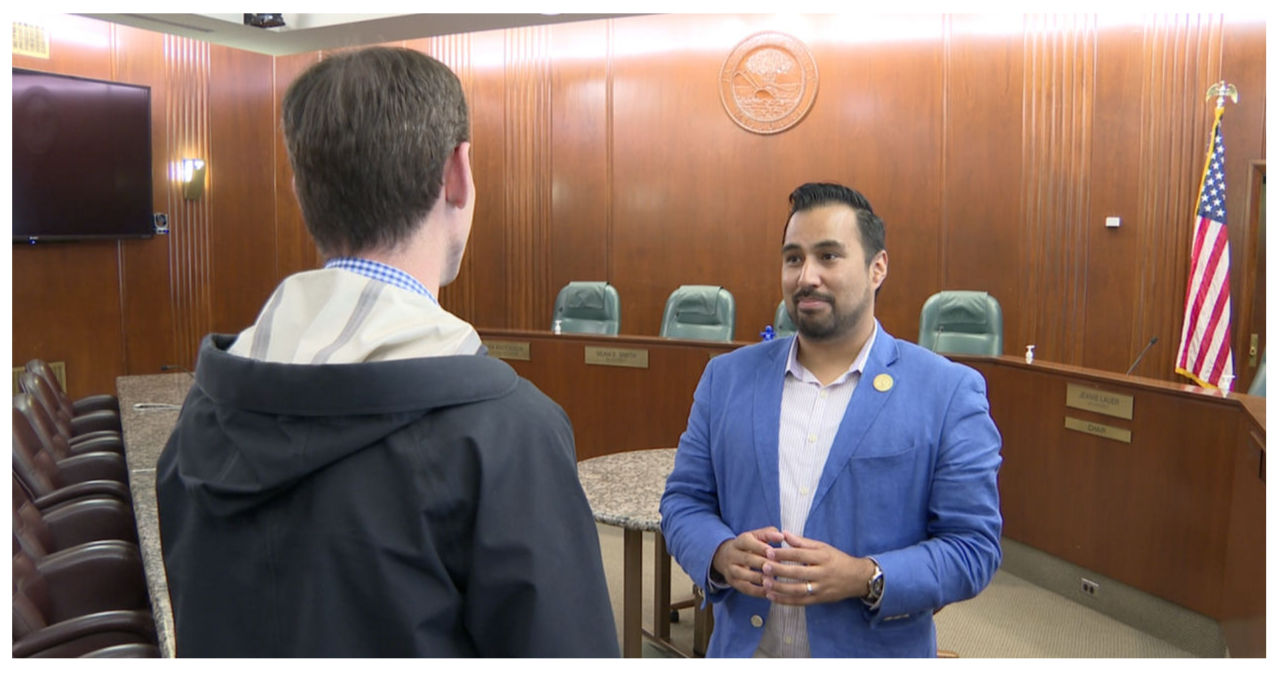A Jackson County legislator is currently in the process of working towards placing a sales tax question on the November ballot. The primary objective of this initiative is to secure the necessary funding for a stadium project that is being undertaken by the Kansas City Chiefs.
Manny Abarca IV, the representative of the county’s first district, is set to present two new ordinances regarding the issue. These ordinances will be brought before the full Jackson County Legislature on May 13th for further discussion and consideration.
Jackson County voters are being asked to approve a 30-year sales tax of 3/16-cent to support the retention of the Chiefs within the county.
Voters are being asked to approve a 3/8-cent sales tax for a period of 40 years through the second ordinance. This tax is intended for the same purpose as the previous one.
Abarca has taken action following the decisive rejection of Question 1 by Jackson County voters about a month ago. The proposed 3/8-cent sales tax aimed to provide funding for stadium projects for the Kansas City Chiefs and Royals.
Leading up to the April 2 vote, the teams worked together to persuade residents to vote “Yes.”
In a recent statement, Chiefs CEO and Chairman Clark Hunt made it clear that the team will be pursuing their own stadium plans separate from the Royals.
Abarca’s proposed ordinances do not allocate any funds for the Royals.
After the failure of Question 1, both teams expressed their intention to search for alternative options beyond Jackson County.
Kansas lawmakers have been diligently working this week to pass a bill aimed at enticing the Chiefs and Royals to relocate to Kansas.
Despite extensive discussions that went late into Tuesday night, the bill utilizing STAR Bond projects to pursue the teams and stadium projects did not pass out of the Kansas Legislature before the conclusion of the 2024 session.
The legislature mentioned the possibility of calling a special session to further address the issue.
Abarca highlighted the efforts made by Kansas lawmakers as one of the driving factors behind the decision to introduce the new ordinances at this particular moment.
Abarca emphasized the importance of not being complacent and waiting for things to happen. Instead, he stressed the need to actively engage in discussions at the right time, which is now.
The Chiefs and Royals chose not to provide any comments regarding the matter.
In a statement, Jackson County Executive Frank White Jr., who was a vocal opponent of Question 1, expressed concerns about the legality of Abarca’s plans.
In light of recent developments regarding a new attempt to introduce a parks sales tax by County Legislator Manny Abarca, I feel compelled to address the residents of Jackson County directly. Less than a month ago, a similar proposal was resoundingly rejected at the ballot, a loss that should have served as a costly but clear lesson.
Over $1 million of taxpayer money was squandered on an unnecessary election — an amount I had hoped would be the most expensive lesson ever learned by those who championed it. Yet, it appears that Legislator Abarca remains undeterred and unconcerned about wasting more taxpayer dollars.
“t is evident that the games have not ended. As long as Legislator Abarca continues to mislead the public, ignore legal restrictions and favor the interests of the affluent and influential over those who elected him, he poses a risk to our community. The law is explicit: no proposal for a parks sales tax can be resubmitted to voters within 12 months of its previous rejection. This statute is designed to respect the voter’s decision and ensure responsible governance, but it seems to be ignored.
As County Executive, I am committed to doing everything within my power to prevent further reckless actions by Mr. Abarca. However, I cannot do this alone. I call upon my colleagues on the legislature, the media and the public to assist in this effort. I urge media outlets to exercise diligence and not propagate narratives unsupported by facts.
Jackson County deserves better. We must stand together to ensure that our fiscal policies and electoral processes reflect the integrity and prudence that our citizens expect and deserve.



